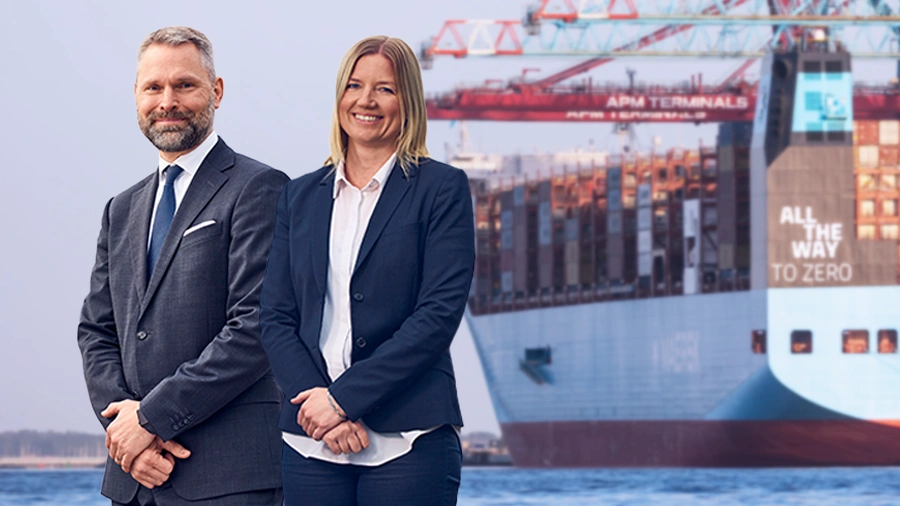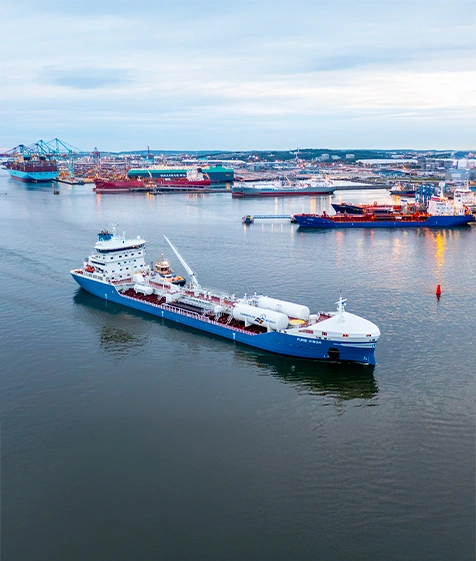Shipping accelerates the transition to fossil-free fuels

Article summary
-
Clear regulations such as FuelEUMaritime are driving demand for renewable fuels.
-
Furetank carried out its first fossil-free port call.
-
Green Corridors from the Port of Gothenburg aim to reduce CO2 emissions in shipping.
-
New calculations for the corridor between Gothenburg and Rotterdam show potential for major emission reductions.
-
Politicians emphasizing the need for stable regulations and incentives.
-
The shipping industry is ready to move from innovation to large-scale transition.
Clear regulations speed up the transition
– One crucial issue is the need for clear, unambiguous regulations, says Edvard Molitor, Head of International Public Affairs & Sustainability at Port of Gothenburg, who moderated the event together with Therese Jällbrink, Head of Renewable Energy at Port of Gothenburg.
During Edvard’s talk at the Renewable Bunker Fuels Forum, he demonstrated this by highlighting how uncertainty surrounding CSRD and CSDDD delays action. In contrast, FuelEUMaritime has shown the positive impact of clarity since its implementation on January 1.
– When I speak with biodiesel suppliers, they report a fivefold increase in demand due to FuelEUMaritime, Therese Jällbrink fills in.
FuelEUMaritime was presented as a crucial factor driving both demand and the willingness of fuel suppliers to invest at the forum. On October 17, IMO’s international regulations are expected to be officially adopted, which will further reduce uncertainty. This is a much-needed step, especially considering Maritime Insight’s estimates at the forum. With an anticipated 40% increase in global shipping, we must boost the supply of alternative fuels. And the industry is ready for it.
– Renaming the event to Renewable Bunker Fuels Forum shows what it has become. We don’t talk about future fuels anymore. We focus on what’s happening here and now. This year, we heard many examples of decisions that have been made and how those affect the industry. If this forum was once a place for PowerPoints about the future, it is now a hotbed for architects of change—people who turn ideas into action, says Therese Jällbrink.
The whole value chain is moving forward
With regulations in place, the industry can better assess the situation, respond, and adapt its business models. And, while sustainable fuels are more costly, making the switch is still cheaper than non-compliance, as one speaker put it.
The shipping industry, while advocating for regulations, incentives, and political support, recognizes the need to reduce its dependence on subsidies. Bart Biebuyck of Green Energy Park, talked about how they seek out locations where they can produce hydrogen affordably, so others can create their preferred fuel. That is just one example of a recurring theme: the need to build viable businesses.
– One great example of this action is Furetank. They recently made their first fossil-free port call and are in the process of transitioning their entire fleet, says Therese Jällbrink, and continues:
– There is growing insight into how there is a first-mover advantage here. Those who act now can grow their business and surpass the competition.
Both freight buyers at the forum and shipping companies emphasized the willingness to pay for more sustainable transportation. This is partly due to companies accepting it and partly because of mounting pressure from eco-conscious customers and consumers. In short, the transition is also driven by the market.

Port of Gothenburg supports through Green Corridors
As a key player in sea freight to and from Sweden, the Port of Gothenburg supports and promotes more sustainable transportation. A main initiative is Green Corridors, which aims to cover the entire logistics chain by, among other things, prioritizing electric vehicles (EVs), using fossil-free fuels, and providing OPS (onshore power supply).
In October, calculations will be available regarding the costs and CO2 reductions for the LBG corridor between Gothenburg and Rotterdam. Around that time, a risk analysis of the proposed route between Gothenburg and Gent/Zeebrugge, where ammonia is the suggested fuel, will also be presented.
The Rotterdam corridor is expected to be operational in 2026, and the timing is perfect given how many are pushing to move away from fossil fuels, says Therese Jällbrink.
Her colleague, Edvard Molitor, agrees:
There are high expectations within the industry and a readiness to act. Naturally, we will do what we can to support that.
A welcome addition this year was the presence of two Swedish MPs. This shows how politicians prioritize these issues. They heard calls for stable regulations and for the EU to reduce the complexity and bureaucracy surrounding the supply of sustainable fuels, which hampers European port competitiveness.
Like the action-focused visitors, the politicians voiced how real change occurs when everyone has a stake in the game. As Helena Gellerman of the Liberals put it: It’s about bringing everyone to the table and providing something for all. However, when everyone receives something, we all must give something in return.
Judging by recent reports, the industry plays along. More shipping companies are ordering vessels designed for renewable bunker fuels, and with a more regulated and manageable playing field, investments are growing. Still, the willingness to pay for sustainable freight on a voluntary basis isn't quite there yet; instead, it needs to be encouraged through regulations or supported by incentives.
There is also extensive work underway to close the cost gap, as Göran Eriksson, CEO of the Port of Gothenburg, mentioned at the forum, before emphasizing that now is the time to move from innovation to scaling up.
– There is a strong determination in the shipping world to do just that, and a will to collaborate, as we all need to pull in the same direction, says Edvard Molitor, and concludes:
I’m already looking forward to next year’s forum. We will gather industry players and representatives from the international political scene to discuss further progress and new initiatives. And based on recent media reports, I am sure there will be a lot of good news well before then.